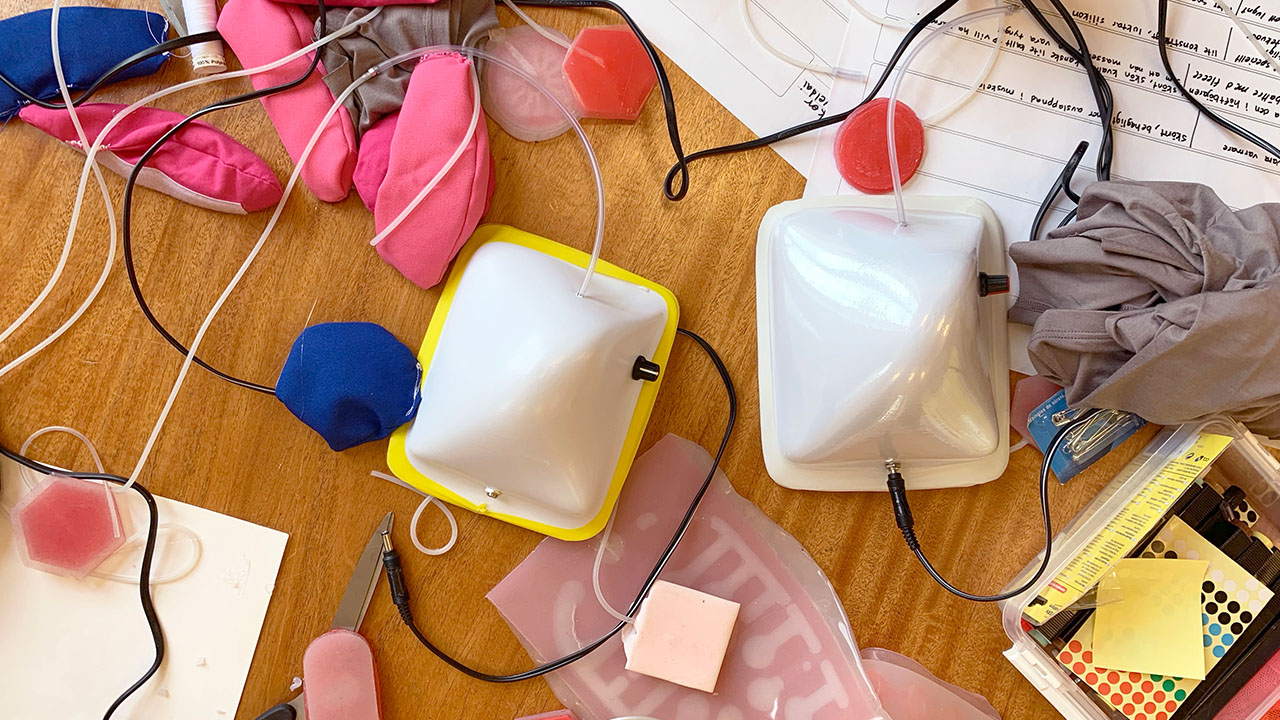New research project on menarche experiences in sports

The design research project Menarche Bits explores how digital technologies can make space for young people’s menarche experiences in sports. KTH has recently entered a collaboration with the National Physical Education program (NIU) at Solna Gymnasium, where they have carried out design workshops with the students.
We have talked to Marie Louise Juul Søndergaard, postdoctoral researcher at the Division of Media Technology and Interaction Design at EECS.
Can you tell us about your project and what it aims to do?
"In the Digital Women’s Health research group, we have started a project exploring digital technologies for adolescents’ experiences of menarche and menstrual cycles in sports contexts. Menarche is the first occurrence of menstrual bleeding and it usually begins between the ages of 9–15. The experience of menarche can be associated with uncertainty, embarrassment, bodily pain, increased self-objectification, and a lack of knowledge and communication. The project aims to develop technologies that can support adolescents in creating self-knowledge and self-acceptance of their menstruating bodies, and feel confident and comfortable to express their experience of menarche.
In this project, we address the challenge of designing wearable technologies for body parts that may be intimate, sensitive and tabooed. We use soma design and participatory design methods, where the participants’ bodies are the starting point for the design of novel technologies. We have designed an open-ended prototyping kit “Menarche Bits” that consists of heat and soft robotic elements, which can be combined with fabric to design body-worn and shape-changing technologies."
What problems do you hope to solve with your research, in let’s say 5 or 10 years?
"The Menarche Bits project is part of the bigger research project Digital Women’s Health that aims to design and research how technologies can support positive change in crucial bodily transitions such as menarche, menstrual cycles and menopause. These transitions are indeed not problems to be solved, but normal experiences that are part of and influenced by bigger societal issues, such as gender inequality and access to healthcare, which we hope that our research can respond to.
Women’s health has previously received very little attention from technology research. With an increasing number of FemTech (female technologies) available on the market, such as algorithmic contraception and menstrual tracking apps, new opportunities and challenges arise. Bodily transitions, such as menarche and menopause, which have previously been in the hands of medical institutions and authorities, are increasingly managed through digital technologies by the individuals themselves. There is very little evidence of how these technologies produce knowledge and feelings of control over the body, and which the role they play in people’s experiences of their changing body. Our goal is to design novel technologies that can be deployed in even the most intimate and sensitive areas of people’s everyday lives to create awareness, appreciation and knowledge on their body."
You are collaborating with Solna Gymnasium. Can you tell us a bit about that collaboration and its purpose?
"We have established a collaboration with Solna Gymnasium and young athletes enrolled in their National Physical Education program(NIU), because we want to partner with the communities that our research aims to serve. The purpose of the collaboration is for our research to have direct relevance and be informed by the young athletes with whom we are designing the technologies.
Since the beginning of 2020, we have been in conversations with teachers and sport coaches at Solna Gymnasium, and carried out design workshops with the students. In the workshops, we used “Menarche Bits” to explore and design technologies for their bodily experiences of menstrual cycles and sport. The participants designed technologies that respond to experiences of menstrual cramps and bloated stomach when menstruating, and feelings of depression and anxiety in the last days of the menstrual cycle. The participants used “Menarche Bits” to design new body-worn and shape-changing technologies that use heat and soft robotic elements to encourage breathing and comfortable stimulation of the body. We will use these concepts generated by the participants to further develop our technologies. We will later deploy them in participants’ everyday lives to elicit reactions on how such technologies can support them in making space for their menstrual cycles in sports. It is our hope that by initiating this research locally with these generous, brave and open young athletes, our work will inspire a new agenda for women’s health technologies that resonates with and provides new perspectives to a wider public."
The people working on the project are Marie Louise Juul Søndergaard, Marianela Ciolfi Felice, Özgün Kilic Afsar and Madeline Balaam.
Read more
Menarche Bits
Digital Women’s Health
NIU i samarbete med forskargrupp vid KTH
